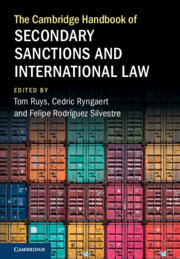Book contents
- The Cambridge Handbook of Secondary Sanctions and International Law
- The Cambridge Handbook of Secondary Sanctions and International Law
- Copyright page
- Contents
- Figures
- Contributors
- 1 Introduction
- Part I Secondary Sanctions
- Part II Secondary Sanctions and General Public International Law
- 6 Secondary Sanctions, Access Restrictions and Customary International Law
- 7 The Correlation Theory
- 8 Challenging Secondary Sanctions in US Courts
- 9 The Application of the Principle of Non-intervention to Secondary Sanctions
- 10 Secondary Sanctions, State Responsibility and Grave Breaches of Jus Cogens Norms
- Part III Secondary Sanctions and International Economic Law
- Part IV Secondary Sanctions in Commercial Practices and Domestic Litigation
- Part V The Future of Secondary Sanctions
- Index
8 - Challenging Secondary Sanctions in US Courts
Reflections on the Halkbank Case
from Part II - Secondary Sanctions and General Public International Law
Published online by Cambridge University Press: 14 December 2024
- The Cambridge Handbook of Secondary Sanctions and International Law
- The Cambridge Handbook of Secondary Sanctions and International Law
- Copyright page
- Contents
- Figures
- Contributors
- 1 Introduction
- Part I Secondary Sanctions
- Part II Secondary Sanctions and General Public International Law
- 6 Secondary Sanctions, Access Restrictions and Customary International Law
- 7 The Correlation Theory
- 8 Challenging Secondary Sanctions in US Courts
- 9 The Application of the Principle of Non-intervention to Secondary Sanctions
- 10 Secondary Sanctions, State Responsibility and Grave Breaches of Jus Cogens Norms
- Part III Secondary Sanctions and International Economic Law
- Part IV Secondary Sanctions in Commercial Practices and Domestic Litigation
- Part V The Future of Secondary Sanctions
- Index
Summary
In 2019, the United States indicted Turkiye Halk Bankasi (Halkbank), a Turkish state-owned bank, alleging a multiyear scheme to evade US sanctions against Iran by using fraudulent transactions to transfer the proceeds of oil and gas sales to Iran. This chapter evaluates the charges against Halkbank under both US domestic law and customary international law. After briefly reviewing the charges against Halkbank and the US district court’s analysis of the extraterritoriality questions, the chapter considers the application of the US presumption against extraterritoriality, concluding that all the charges except for the bank fraud charges survive this analysis. The conclusion with respect to customary international law, however, is quite different. Under customary international law, the United States lacks jurisdiction to prescribe when its only connection to the foreign defendant is the clearing of transactions through banks in the United States. Because the International Emergency Economic Powers Act authorizes sanctions on financial transactions only when the person or property is subject to the jurisdiction of the United States, the sanctions regulations cannot lawfully be applied to Halkbank.
Keywords
- Type
- Chapter
- Information
- Publisher: Cambridge University PressPrint publication year: 2024

